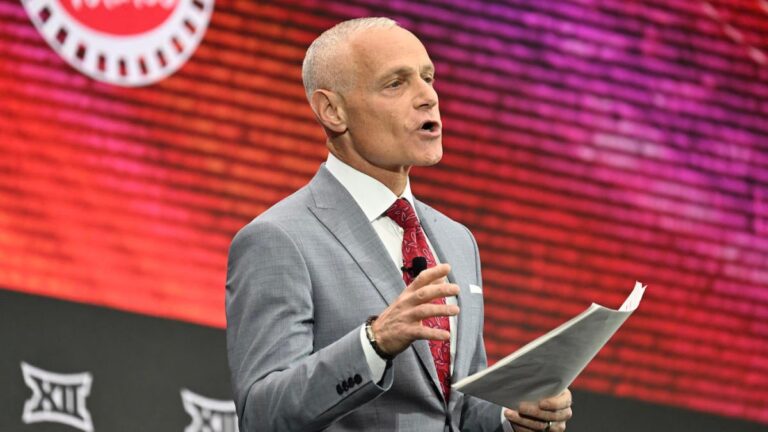LAS VEGAS — Big 12 Commissioner Brett Yormark told the nation during his inaugural press conference that the conference is “open for business,” and two years later, that statement is starting to take shape.
Now standing at Allegiant Stadium in Las Vegas, a stadium he calls “the sports and entertainment capital,” Yormark touted his business success. Big 12 sponsorship revenue is up 79% in 2023-24, with ticket revenue up 23%. Yormark also announced new branding partnerships with TuneIn Radio and Microsoft for sideline and coaching box tablets. A FAST (free, ad-supported streaming TV) channel is also reportedly in the works.
“I often refer to our league as a mature startup,” Yormark says, “which means our brand is younger, more progressive and more innovative than our peers.”
The startup atmosphere is a perfect fit for a league where everything is truly on the table. In the past two years, half the league’s roster has been replaced: Texas and Oklahoma dropped out, and four former Pac-12 schools joined four former Group of Five schools, bringing the conference to 16 schools for the first time in history.
Part of the startup vibe is also the expansion across four time zones. The conference’s media day will be held in Las Vegas for the first time, and Yormark said the conference is eyeing a bowl partnership with the Las Vegas Bowl to boost its presence in that particular market. The Big 12 is also pushing for uniform patches, approved by Big 12 officials, to be placed on referees’ jerseys, following in the footsteps of the NBA, which recently went down the same path.
“We are experiencing change, but I would rather call it a necessary reset,” Yormark said. “Ten years from now, we will look back on this as a positive moment in the history of college sports.”
While many aspects of the revenue generation have been popular, others may soon be at odds with fans in the Big 12. For one, the Big 12 is exploring alternative time slots for games that may not be in a favorable position on Saturday.
“Saturday is a very eventful and competitive day,” Yormark said, “so the question is, are there additional television slots available that can highlight and expand our football programming? We’re exploring that.”
CBS Sports reported in June The Big 12 has begun negotiations with private equity firms.Yormark did not go into details but acknowledged that discussions had taken place.
“Given where we are in this industry, I think it makes a lot of sense to have capital resources as partners,” Yormark said. “That’s how you do good business. I truly believe that. And when you see private equity getting into professional sports, I think at some point it’s going to get into college sports as well.”
Several companies have expressed interest in college sports recently, including proposed deals that would see them sell conference shares in exchange for a cash infusion, but there are obvious risks to losing long-term ownership and revenue, and it’s unclear how private equity will view a sport that doesn’t generate the revenue that has been the bedrock of college sports for generations.
“We’re looking at what that might look like, and the structure and model will be crucial to not jeopardize the long-term future of the conference,” Yormark said. “We’ve brought in experts in each field as we’ve looked at possibilities. Whatever we do has to benefit the conference in the short and long term and provide options for the schools.”
Perhaps the most interesting move is the sale of the conference’s naming rights. Yormark was with NASCAR when the Cup title name changed from the Winston Cup to the Nextel Cup, and while with the Brooklyn Nets, he helped broker naming rights deals for the IZOD Center and Barclays Center. Of course, it’s unprecedented for a college sports conference to consider selling the actual name. But it all comes with a startup vibe.
“We need people who are going to elevate and expand the conference, that’s critical,” Yormark said. “If they’re just looking to leverage the power of the Big 12 brand, then there’s no benefit to us. If they’re going to come in and it makes economic sense and they’re going to create value for us, then that’s a very interesting opportunity for us.”
The departure of Texas and Oklahoma to the SEC leaves the Big 12 without a flagship brand: No team from the conference has won a national championship in the past 30 years, and the new 12-team College Football Playoff format makes it hard to pinpoint which teams could become serious contenders.
But no conference has been as aggressive in exploring avenues to increase non-television revenue as the Big 12. Will it work? That remains to be seen.
“There’s never been a better time to be in the Big 12,” Yormark asserted. “We’re more relevant than ever.”

